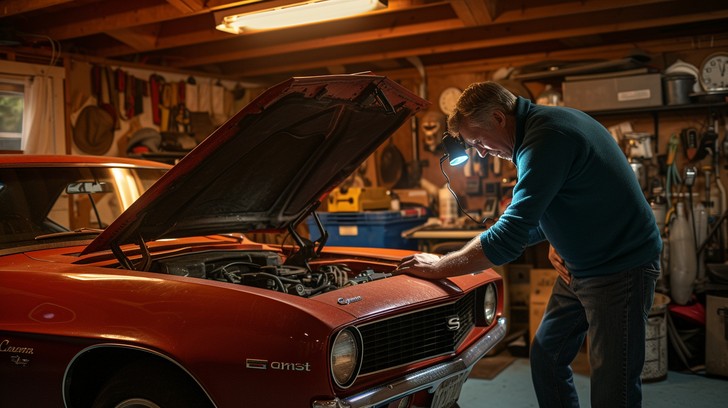Saturday morning. The air is calm, your playlist is ready, and you finally have a few hours to yourself. Most people would head straight for brunch or a nap, but here’s something that could save you money, improve your safety, and keep your car running like new—all without leaving your driveway. A little weekend car care can go a long way.
Car maintenance often sounds like something best left to professionals. While some repairs should definitely be handled by a mechanic, there are plenty of simple tasks you can take care of yourself. The best part? None of them require special tools or expert knowledge—just a bit of attention and consistency.
Here are a few easy things you can do this weekend to keep your car in great shape.
1. Check your tire pressure
Your tires carry the entire weight of your car, so keeping them properly inflated is one of the simplest ways to improve safety and performance. Underinflated tires reduce fuel efficiency, while overinflated ones wear out faster.
Grab a tire pressure gauge (they’re inexpensive and easy to find), and compare your readings with the recommended levels listed in your car manual or on the sticker inside your driver’s door. If the pressure is low, stop by a gas station to top it up. This small task can extend your tire life and make your drives smoother.
2. Inspect your fluids
Your car runs on more than just fuel. Engine oil, brake fluid, coolant, windshield washer fluid, and transmission fluid all keep different parts of your car running properly.
Start by checking your engine oil. Pull out the dipstick, wipe it clean, reinsert it, and pull it out again to check the oil level and color. If it’s dark or gritty, it’s time for an oil change. Next, open your hood and glance at the coolant reservoir—it should be between the minimum and maximum marks. While you’re there, top off your windshield washer fluid if it’s low.
These quick checks help you catch small issues before they turn into costly problems.
3. Clean your battery terminals
If your car sometimes struggles to start, corrosion around your battery terminals could be the reason. The good news is that cleaning them takes just a few minutes.
Turn off the engine, disconnect the battery cables (negative first), and use a small brush or an old toothbrush to remove any white or blue residue. You can even use a mixture of baking soda and water to neutralize the corrosion. Once everything looks clean, reconnect the cables tightly.
A clean battery connection ensures your car starts easily and your electrical systems run efficiently.
4. Replace your wiper blades
Few things are as frustrating as streaky wipers during a sudden downpour. Wiper blades wear out faster than most people think—usually every six to twelve months.
Check for cracks, stiffness, or squeaking when you turn them on. If they’re not wiping cleanly, it’s time for new ones. Replacements are affordable and easy to install—usually just a simple clip mechanism. Clear visibility keeps you safe, especially during unpredictable weather.
5. Clean your air filters
Your car has two main filters: the engine air filter and the cabin air filter. Both are easy to access and replace, and both can have a big impact.
A clogged engine filter makes your car work harder, reducing performance and fuel economy. A dirty cabin filter affects your air quality inside the car. Check your manual for their exact locations—most are found under the hood or behind the glove compartment. Replacing them takes only a few minutes but makes a noticeable difference in how your car feels.
6. Check your lights
It’s easy to forget about your lights until you’re driving at night and notice one is out. Turn on your headlights, brake lights, and turn signals, then walk around your car to ensure they’re all working.
If a bulb is out, replacing it is usually simple. You can find the correct replacement type in your car manual or at an auto parts store. Functional lights keep you visible to other drivers and help you avoid fines or safety risks.
7. Wash and wax your car
A clean car doesn’t just look good—it lasts longer. Dirt, dust, and bird droppings can wear down your paint over time, leading to rust or fading.
Take a few minutes to give your car a proper wash. Use car-safe soap, not dish detergent, which can strip away protective coatings. Dry it with a microfiber cloth to avoid water spots. If you want to go the extra mile, apply a layer of wax to protect the paint and give it a lasting shine.
8. Organize your interior
Your car feels better to drive when it’s clean inside. Remove clutter, wipe down surfaces, vacuum the seats and floors, and spray a bit of fabric freshener. This quick cleanup not only makes your car look and smell better but also gives you a sense of order and calm.
9. Inspect your belts and hoses
Open your hood and take a look at the rubber belts and hoses. Look for any cracks, fraying, or bulges. These parts may seem small, but they’re crucial to your engine’s operation. If you notice signs of wear, schedule a visit to your mechanic before they fail.
Make it a habit
Spending an hour or two each weekend on basic maintenance is one of the smartest habits you can build as a car owner. It prevents breakdowns, saves you money, and gives you confidence that your vehicle is in good condition.
You don’t need to be a car expert to take care of your car—you just need consistency. A little attention now keeps you from paying for big repairs later, and it makes every drive a little smoother.
So next weekend, before you scroll through your to-do list or plan another outing, grab a coffee, step outside, and give your car a little care. It’ll thank you every time you start the engine.


